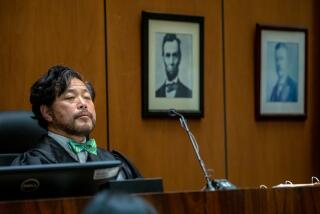Reiner’s Remarks Disputed by Judge : Denny case: Supervising jurist says the D.A. could not have known who backups for the bench were because he did not disclose them.
- Share via
Los Angeles County Superior Court Judge Cecil Mills on Friday challenged Dist. Atty. Ira Reiner’s contention that Mills had planned to assign a racially charged riot trial to a black judge in Compton after Reiner’s office removed another African-American jurist from the case.
Mills, the supervising judge of the court’s Criminal Division, said Reiner could not have known of his plans because he did not disclose them.
“I am not in the business of misleading people,” said Mills, who assigns judges to criminal cases, during an interview Friday with The Times. “The choice of the second judge to hear this case was a most closely guarded secret.”
Although he did not accuse Reiner of lying, the judge’s comments cast doubt on the district attorney’s veracity, adding more fuel to a controversy that has embarrassed the county’s top prosecutor.
Last Tuesday, a Reiner deputy removed a black judge, Roosevelt F. Dorn, from the case of three African-American suspects charged with attacking truck driver Reginald O. Denny and other motorists during the opening hours of the riots. After a white judge, George Trammell, was removed by defense lawyers, the case was assigned to Judge John H. Reid, who is also white.
Supporters of the defendants have accused Reiner and his staff of lying and of racial insensitivity for the way they handled the judicial challenges. Friday’s developments only inflamed the problems for the district attorney, who is running for reelection.
Sandi Gibbons, a spokeswoman for the district attorney’s office, said Reiner would not respond to Mills’ remarks.
Trying to explain why Reiner’s staff had removed Dorn, Gibbons first claimed that the black judge was challenged because he had a full calendar and because his courtroom lacked special security measures needed for this case.
But after Dorn called a news conference to rebut those claims, Reiner said the real reason for his removal was because in previous cases the judge’s temperament was called into question by the county public defender’s office. Reiner said those challenges suggested to him that Dorn could not handle a case as highly charged as the Denny matter.
Reiner added that his office’s first explanation was made in order to spare the judge’s feelings.
On Friday, after hearing Mills’ latest challenge to Reiner’s version of events, one defense attorney was quick to attack the chief prosecutor’s integrity.
“He just goes from one lie to the next,” said lawyer James R. Gillen, who represents Antoine Eugene Miller, one of the three defendants. “Each lie compounds the next one.”
Miller, Damian Monroe (Football) Williams and Henry Keith (Kiki) Watson face charges of attempted murder, aggravated mayhem and torture in the attack on Denny, as well as less serious charges for allegedly attacking and robbing other victims. All three defendants are black, and their supporters have accused police and prosecutors of racial bias.
The latest issue involves the complicated succession of judges who were proposed to hear the Denny case. In an interview Thursday, Gibbons had said that prosecutors “clearly understood” that once they had removed Dorn, Mills would propose that the case be sent to Trammell.
Gibbons added that the defense lawyers were expected to use their peremptory challenge to strike Trammell, and that both sides would then be left with Superior Court Judge Donald F. Pitts, who is black and works in the Compton courthouse.
Under court rules, lawyers for both sides of a case are allowed one peremptory challenge to a judge. If lawyers exercise that challenge, the judge is automatically removed from a case.
Mills acknowledged Friday that Pitts’ name came up in conversations with a representative of the district attorney’s office--although he declined to elaborate on those discussions. Mills added that he never indicated which backup judges he might propose, and said that Trammell was never mentioned in any conversation.
In fact, Mills said, he did not pick Trammell until after Dorn was removed from the case.
Gillen and defense attorney Earl C. Broady, who represents Watson, backed Mills’ explanation, saying that the judge never told them which alternate jurists he was considering.
“Nobody knew that the case was going to Trammell until 20 seconds before that decision was announced,” Mills said.
Saying that he did not want to be dragged into a political debate, Mills declined to speculate on Reiner’s reasons for claiming to know the order in which judges would be proposed.
The matter will resurface Monday, as Gillen has asked the court to remove Reid from the case. That motion is set for a hearing.
Once the hearing is complete, Mills intends to return the matter to his courtroom, where he said he will make a statement regarding the assignment of a judge.
Mills added, however, that he would not remove Reid from the case just because defense lawyers and prosecutors say they would rather have a black judge presiding.
“The case has been assigned to a judge,” Mills said. “Unless there is some legal impediment, why would I reassign it? If some legal impediment arises, that’s a different matter, and I will consider that Monday.”
Even as the fallout from the judge controversy continued Friday, the district attorney and Dorn escalated their unusual public feud. Dorn appeared on KABC radio, and was confronted there by new accusations from Reiner.
According to Reiner--who called the show earlier and was taped--the judge was investigated by the then-presiding Superior Court judge and found to have abused his judicial power.
Dorn angrily rebutted Reiner’s remarks, saying that that inquiry was flawed.
“Ira Reiner is either misinformed,” Dorn said, “or he is an out-and-out liar.”
More to Read
Sign up for Essential California
The most important California stories and recommendations in your inbox every morning.
You may occasionally receive promotional content from the Los Angeles Times.














